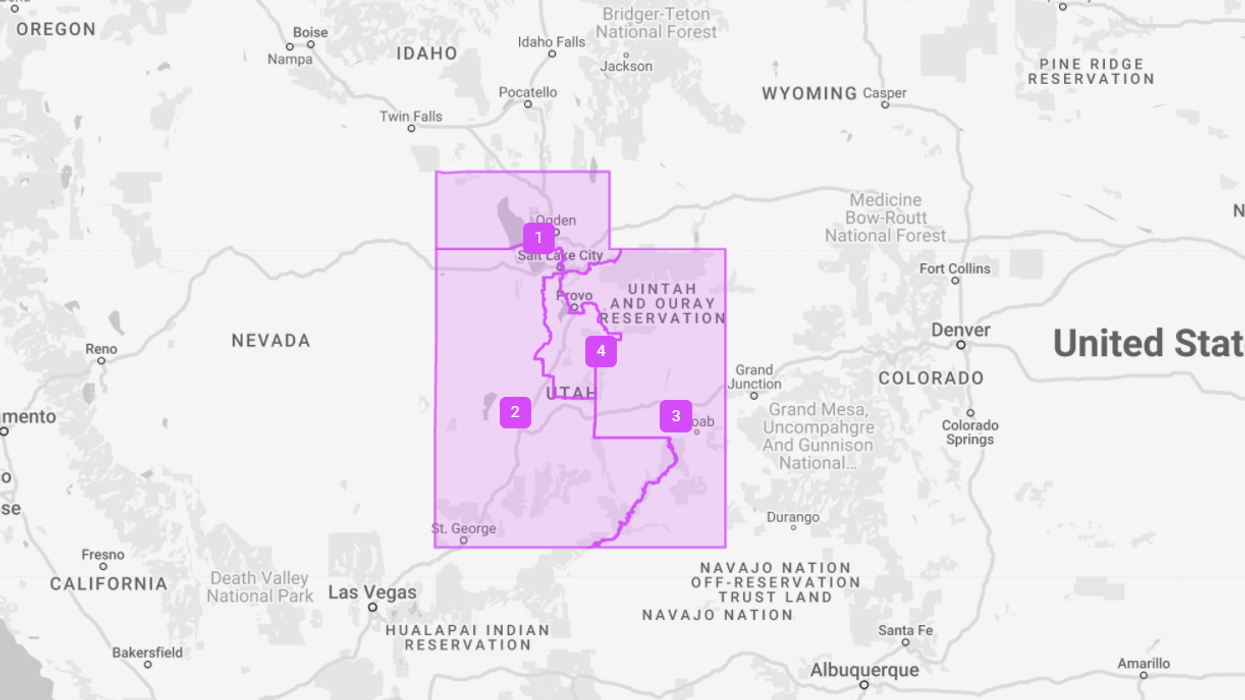The latest redistricting lawsuit was filed Thursday morning in Utah, where a collection of voting rights advocates and individual voters are fighting what they say is an extreme example of partisan gerrymandering.
The plaintiffs in the case argue the Utah Legislature violated the state Constitution when it approved a congressional map that ignored the will of voters and created districts that eliminated the ability for a minority party to compete.
Led by the League of Women Voters of Utah, the Campaign Legal Center and Mormon Women for Ethical Government, the lawsuit asks the court to prevent the map from being used in 2024 and to reinstate a voter-approved independent redistricting commission.
In 2018, Utah voters approved a ballot measure, known as Proposition 4 or the Better Boundaries initiative, which created an independent redistricting commission. However, in 2020 the Legislature passed a new law that removed the commission’s authority, leaving it as an advisory board and granting final approval of district maps back to lawmakers.
Utah is a solidly Republican state with an all-GOP congressional delegation. However, for most of the past 20 years, the Salt Lake City area was represented by Democrats. The map proposed by the redistricting commission would have included one Democratic-leaning seat, but the lines drawn and approved by the Legislature “cracks” the Salt Lake City area, splitting voters into four heavily GOP districts.
“Unfair maps and gerrymandering dilute the voices of communities and consequently hurt voters of all parties,” said Catherine Weller, president of LWV of Utah.
While the portion of the lawsuit focused on the cracking of Salt Lake City would benefit Democrats in the state, one count has the backing of both Republican and Democratic voters who want to protect the rights of Utahns, according to organizers.
Article I, Section 2 of the Utah Constitution reads: “All political power is inherent in the people; and all free governments are founded on their authority for their equal protection and benefit, and they have the right to alter or reform their government as the public welfare may require.”
The lawsuit argues the Legislature violated that section when it repealed Proposition 4, engaging in “post-hoc nullification” of voters' rights to reform the government through ballot initiatives.
“Independent redistricting commissions, like the one created through Proposition 4, are a pro-voter reform that helps ensure voters are the ones who decide how the electoral districts are drawn,” said Paul Smith, senior vice president at Campaign Legal Center.
Because Utah’s filing window for candidates closed March 4 and the primary will be held June 28, the plaintiffs are not trying to change the map for the 2022 election, but rather create new maps for 2024 and beyond.
Partisan gerrymandering is purely a state issue, ever since the Supreme Court ruled in 2019 that it had no jurisdiction in such matters (although federal courts are still a venue for allegations of racial gerrymandering).
Utah is now the 15th state where a lawsuit has been filed over partisan gerrymandering, according to the left-leaning Brennan Center for Justice. Courts have ordered new maps to be drawn in Alaska, North Carolina and Ohio.




















Trump & Hegseth gave Mark Kelly a huge 2028 gift